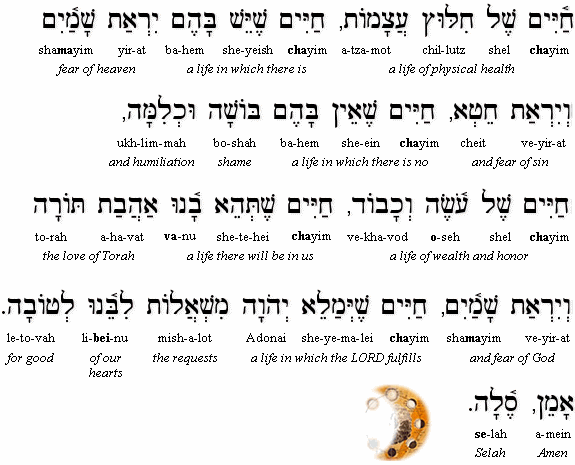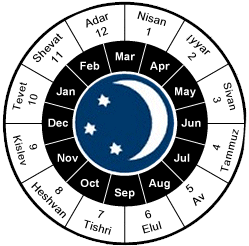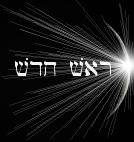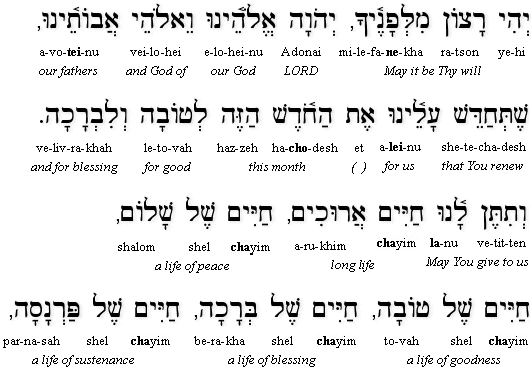|
The first time that the waxing crescent of the Moon is visible (from Jerusalem) marks the beginning of a Jewish month, called Rosh Chodesh ("head of the month"). Twelve chodashim make a shanah or year (however, since 12 x 29.5 equals 354 days, but a solar year is 365 days, an extra month (called Adar Sheni) is added to the Hebrew calendar every two or three years in order to keep the solar seasons aligned with the lunar calendar).
Astronomy note: The Earth's moon is about 400 times smaller than the Sun but it is also about 400 times closer, so that they both appear to be about the same size in the sky. This accords with the Scripture that says, "And God made two great lights; the greater light to rule the day, and the lesser light to rule the night" (Gen. 1:16).
Months of the Biblical Calendar...
Since a Hebrew month may be either 29 or 30 days long, Rosh Chodesh may occur at two times during a given month of the year:
- If the current month has 29 days, Rosh Chodesh is observed on the first day of the new month (at sundown from the perspective of Jerusalem).
- If the current month has 30 days, Rosh Chodesh is observed on the last day of the month as well as on the first day of the new month.
The Shabbat service before the new moon is called Shabbat Mevarkhim (ū®ūüųĘūæų╝ųĘū¬ ū×ų░ūæųĖū©ų░ūøų┤ūÖūØ), or the "Sabbath that blesses the month." After the Torah reading service, the leader holds the Torah scroll, recites a blessing for a good month, and then announces the day of the upcoming week when the new month will begin. Note that Shabbat Mevarekhim is not observed during the month of Elul (to announce the beginning of Tishri), since the entire month of Elul is a period of selichot and preparation for Rosh Hashanah and the High Holidays.
On the actual day that Rosh Chodesh occurs (in the coming week), the daily prayer service includes a musaf (additional) portion including part of Hallel (readings from the Psalms), an addition to the Shemoneh Esrei (about of the extra sacrfice brought to the temple for Rosh Chodesh) and an additional Torah reading (Numbers 28:11-15).
ūóųĖū®ūéųĖūö ūÖųĖū©ųĄūŚųĘ ū£ų░ū×ūĢų╣ūóų▓ūōų┤ūÖūØ
ū®ūüųČū×ųČū®ūü ūÖųĖūōųĘūó ū×ų░ūæūĢų╣ūÉūĢų╣
ah┬Ęsah ┬Ę yah┬Ęre'┬Ęach ┬Ę le┬Ęmoh┬Ęa┬Ędeem
sheh'┬Ęmesh ┬Ę yah┬Ęda' ┬Ę me┬Ęvoh┬Ęoh

"He made the moon to mark the appointed times;
the sun knows its time for setting" (Psalm 104:19)
Download Study Card
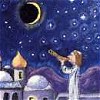
The Torah of Rosh Chodesh
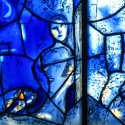
According to Rabbinic tradition, the very first commandment given to the children of Israel after being delivered from Egypt was to sanctify the new moon (Exodus 12:1-2), thereby causing the fledgling nation to depart from the solar tradition of the Egyptians (Ra worship) and to look to the moon for a new means of reckoning time and seasons:
ūöųĘūŚų╣ūōųČū®ūü ūöųĘū¢ų╝ųČūö ū£ųĖūøųČūØ ū©ų╣ūÉū®ūü ūŚų│ūōųĖū®ūüų┤ūÖūØ
ū©ų┤ūÉū®ūüūĢų╣ū¤ ūöūĢų╝ūÉ ū£ųĖūøųČūØ ū£ų░ūŚųĖūōų░ū®ūüųĄūÖ ūöųĘū®ų╝ūüųĖūĀųĖūö
ha┬Ęcho'┬Ędesh ┬Ę ha┬Ęzeh ┬Ę la┬Ękhem ┬Ę rosh ┬Ę cho┬Ęda┬Ęsheem
ree┬Ęshohn ┬Ę hoo ┬Ę la┬Ękhem ┬Ę le┬Ęchod┬Ęshei ┬Ę ha┬Ęsha┬Ęnah

"This month shall be for you the beginning of months;
it shall be the first month of the year for you." (Exod. 12:2)

Hebrew Lesson:
 |
The emergence of the moon - from darkness to light - is a picture of God's salvation for the Jewish people and our personal deliverance from darkness to light. Note that the word for month is chodesh, etymologically related to chadash, meaning new.
In Talmudic times, the day marking the New Moon was fixed by actual observation by at least two witnesses. As soon as the new moon was visible as a waxing crescent, the Sanhedrin (the Supreme Rabbinical Court) in Israel was informed and Rosh Chodesh was formally announced (this system was later discarded in favor of the fixed calendar developed by Hillel II (c. 360 CE.), which has been in use to the present day). The day after the new moon was sighted was a festival, heralded with the sounding of the shofar and commemorated with convocations and sacrifices.
Knowing precisely when Rosh Chodesh began was critical to the order of the mo'edim, or appointed times commanded by the LORD. In fact, the entire Jewish calendar was dependent upon knowing when Rosh Chodesh began, and without this information the set times for the festivals and holidays would be lost. Therefore, during times of persecution (e.g., by the Syrian-Greeks), the Jews were often forbidden to observe Rosh Chodesh as well as Shabbat, in order to keep them from obeying God.
Note: The correlation between the moon's monthly cycle and a woman's monthly cycle helped establish Rosh Chodesh as a women's holiday. In the Talmud [Megillah 22b], we read that women are exempt from work on Rosh Chodesh.
Rosh Chodesh and the World to Come

The Bible begins and ends with the Tree of Life (ūóųĄūź ūŚųĘūÖų╝ų┤ūÖūØ) -- first in the orchard of Eden, and then in the midst of the paradise of heaven. ŌĆÄ"The Tree of Life (etz ha-chayim) was in the midst of the garden.." (Gen. 2:9). "Then the angel showed me the river of the water of life, bright as crystal, flowing from the throne of God and of the Lamb through the middle of the street of the city; also, on either side of the river, the Tree of Life (etz ha-chayim) with its twelve kinds of fruit, yielding its fruit each month...." (Rev. 22:1-2).
Notice that the "twelve fruits" (╬║╬▒ŽüŽĆ╬┐ßĮ║Žé ╬┤ßĮĮ╬┤╬Ą╬║╬▒) from the Tree of Life are directly linked to the "twelve months" of the Jewish year (╬║╬▒ŽäßĮ░ ╬╝ß┐å╬Į╬▒ ß╝Ģ╬║╬▒ŽāŽä╬┐╬Į ß╝ĆŽĆ╬┐╬┤╬╣╬┤╬┐ß┐”╬Į ŽäßĮĖ╬Į ╬║╬▒ŽüŽĆßĮĖ╬Į ╬▒ßĮÉŽä╬┐ß┐”: "each month rendering its fruit"). Twelve months; twelve fruits.... The sequence of the holidays (moedim) were always intended to teach us great revelation about God. That is why God created the Sun and the Moon for signs and for "appointed times" (Gen. 1:14). As it is also written: "He made the moon to mark the appointed times (ū£ų░ū×ūĢų╣ūóų▓ūōų┤ūÖūØ); the sun knows its time for setting" (Psalm 104:19). Note further that the Majority Text of Revelation 22:14 reads: "Blessed are those who do His commandments (╬£╬▒╬║ßĮ▒Žü╬╣╬┐╬╣ ╬┐ß╝▒ ŽĆ╬┐╬╣╬┐ß┐”╬ĮŽä╬ĄŽé ŽäßĮ░Žé ß╝É╬ĮŽä╬┐╬╗ßĮ░Žé ╬▒ßĮÉŽä╬┐ß┐”) so that they may have access the Tree of Life..." Faith and obedience are two sides of the same coin.
Should Christians Observe the "New Moon"?
In Colossians 2:16-17 the Apostle Paul writes, "Therefore let no one pass judgment on you in questions of food and drink, or with regard to a festival or a new moon or a Sabbath. These are a shadow of the things to come, but the substance belongs to Christ." But what does verse 17 mean? The Greek text reads: ß╝ģ ß╝ÉŽāŽä╬╣╬Į Žā╬║╬╣ßĮ░ Žäß┐Č╬Į ╬╝╬Ą╬╗╬╗ßĮ╣╬ĮŽäŽē╬Į, ŽäßĮĖ ╬┤ßĮ▓ Žāß┐Č╬╝╬▒ Žä╬┐ß┐” ╬¦Žü╬╣ŽāŽä╬┐ß┐”, but note that the shadow (Žā╬║╬╣ßĮ░) is of the things to come (Žäß┐Č╬Į ╬╝╬Ą╬╗╬╗ßĮ╣╬ĮŽäŽē╬Į) - which was written in reference to the future (at the time of writing). The word translated "substance" (Žāß┐Č╬╝╬▒) is perhaps better rendered as "body," and may refer to the body the Messiah, i.e., the followers of Yeshua... In light of this, are we supposed to recognize the new moon or not?
Well, since we are not under the terms of the Sinai covenant but the New Covenant, the short answer is that we are not obligated to observe this appointed time any more than we are obligated to keep kosher law, to sacrifice a sheep during Passover, or to elevate the weekly Sabbath above other days of the week (Rom. 14:5-6). However, according to the prophet Isaiah, in the Millennial Kingdom people will observe Rosh Chodesh: "It shall be that from one Rosh Chodesh to another, and from one Shabbat to another, shall all flesh come to worship before me, declares the LORD" (Isa. 66:23), and the prophet Ezekiel also mentions Rosh Chodesh in the coming Millennial Temple (Ezek. 46:1-7).
ūĢų░ūöųĖūÖųĖūö ū×ų┤ūōų╝ųĄūÖųŠūŚų╣ūōųČū®ūü ūæų╝ų░ūŚųĖūōų░ū®ūüūĢų╣
ūĢų╝ū×ų┤ūōų╝ųĄūÖ ū®ūüųĘūæų╝ųĖū¬ ūæų╝ų░ū®ūüųĘūæų╝ųĘū¬ų╝ūĢų╣
ūÖųĖūæūĢų╣ūÉ ūøųĖū£ųŠūæų╝ųĖū®ūéųĖū© ū£ų░ūöų┤ū®ūüų░ū¬ų╝ųĘūŚų▓ūĢų╣ū¬ ū£ų░ūżųĖūĀųĘūÖ
ūÉųĖū×ųĘū© ūÖų░ūöūĢųĖūö
ve┬Ęha┬Ęyah mee┬Ędei-cho'┬Ędesh be┬Ęchod┬Ęsho
oo┬Ęmee┬Ędei sha┬Ębat be┬Ęsha┬Ęba┬Ęto
ya┬Ęvo khol-ba┬Ęsar le┬Ęheesh┬Ęta┬Ęcha┬Ęvot le┬Ęfa┬Ęnai
a┬Ęmar Adonai

"And it shall be that from one new moon to another,
and from one sabbath to another,
all flesh shall come to worship before me
declares the LORD." (Isa. 66:23)
Download Study Card

Hebrew Lesson:
 |
In other words, there is an eschatological (future) dimension to the New Moon and it is therefore part of our future heritage with the LORD God of Israel. While we are therefore not (legalistically) obligated to observe the Sabbath or the New Moon, we nonetheless recognize that they are part of the divine calendar that the LORD Himself instituted, and that they therefore have spiritual application to our lives as believers living under the terms of the New Covenant (Gal. 4:4). As members of the household of Israel (Eph. 2:12-20), we don't "have to" observe the moedim (holidays, appointed times) - but it surely is an honor and great joy to do so, especially when we appreciate how the glory of Yeshua is revealed in each of them. Yeshua the Messiah - the same yesterday, today, and forever (Heb. 13:8).
Rosh Chodesh and Torah Readings
In Jewish tradition, the last Sabbath of the month before the appearance of the new moon (i.e., Rosh Chodesh) is called Shabbat Mevarkhim (ū®ūüųĘūæų╝ųĘū¬ ū×ų░ūæųĖū©ų░ūøų┤ūÖūØ, "Sabbath of Blessing"), and an additional prayer is recited asking God to bless the coming month.

If the Sabbath occurs exactly one day before the new moon, however, it is called Shabbat Machar Chodesh (ū×ųĖūŚųĖū© ūŚūōųČū®ūü, "Shabbat of tomorrow's moon") and a different Haftarah portion (i.e., 1 Sam. 20:18-42) is read instead of the assigned weekly Haftarah.
If the Sabbath falls on the day of the new moon itself, it is called Shabbat Rosh Chodesh (ū®ūüųĘūæų╝ųĘū¬ ū©ūÉū®ūü ūŚūōųČū®ūü) and an additional Torah reading (i.e., Num. 28:9-15) and Haftarah portion (i.e., Isa. 66:1-24) are recited during services. The additional Torah reading describes the special Rosh Chodesh offerings given at the Tabernacle: "At the beginnings of your months, you shall offer a burnt offering to the LORD" (Num. 28:11). The Haftarah portion -- the last chapter of the Book of Isaiah (Isaiah 66) -- foretells of a great pilgrimage to Jerusalem after the End of Days, when Yeshua will be reigning upon the earth as Israel's Savior and Messiah: "From new moon to new moon, and from Sabbath to Sabbath, all flesh shall come to worship before me, declares the LORD" (Isa. 66:23).
Hebrew Lesson:
Birkat HaChodesh (Sanctification of the Month)
The Birkat HaChodesh is typically said during Shabbat Mevarchim (i.e., the last Sabbath of the month before Rosh Chodesh) to petition the LORD for a good month. It is recited at the synagogue at the end of the Shabbat Torah reading service:
|


